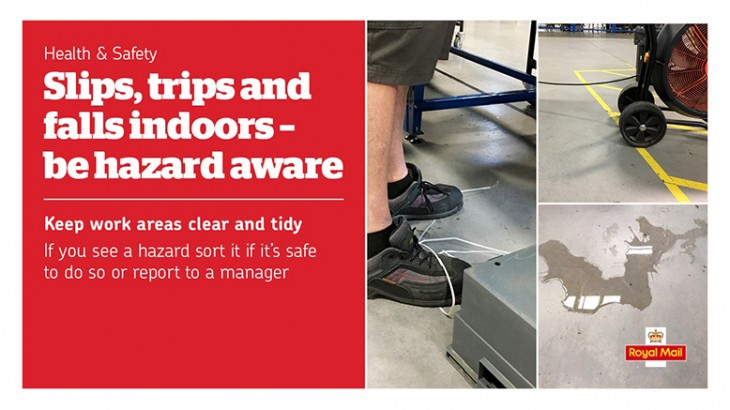Look. Consider. Decide

Slips, trips and falls are our second highest cause of accidents in the workplace and account for nearly three-quarters of our most serious injuries, and our greatest cause of lost time accidents (LTAs).
To date, this year, we have already recorded 667 slip and trips accidents, 133 of which have resulted in colleagues being unable to attend work and as such have become a LTA. From those accidents, 61 colleagues reported major injuries such as fractured ankles, wrists, legs and hips.
In this week’s RMtv, you’ll be able to hear a real account from Potters Bar postman Frank McNally, who lost the sight in one eye when he suffered a fall on Delivery. Visit myroyalmail.com/RMtv to view it.
This week is Slips and Trips Week, the aim being to raise the profile of these types of accidents and encourage managers and colleagues alike, to do everything they can to prepare for the coming winter months, when we know conditions outside can become more challenging.
How can we reduce the likelihood of suffering a broken bone?
Keep work areas clear and tidy. Most slips and trips occur outside of Royal Mail premises, but they can easily occur in units. To reduce hazards:
- Keep walkways clear – don’t leave bags and trays on the floor for example, and bin strappex.
- Return equipment to its correct place – containers or work equipment can be a trip hazard.
- Clean spillages immediately – have drinks in self-messing areas or canteens.
Identifying and reporting hazards
A slip/trip hazard is anything that has the potential to cause harm so needs to be identified, reported and recorded. Actions can then be taken to reduce the risk.
- Hazards inside the workplace can include equipment and strappex on the floor, spillages and wet surfaces.
- Hazards outside of the workplace include damaged/uneven steps or paving, raised or slippery manhole covers and drains, rubbish or debris on paths or unexpected obstructions.
What about our own actions?
- Our own behaviours can also lead to injury. Here are some golden rules you should always follow.
- ALWAYS consider your footing and carefully turn at the doorstep before moving away – NEVER step backwards.
- ALWAYS be aware of your surroundings and look where you are walking/moving to avoid stepping on uneven surfaces, wet surfaces and other debris or obstructions.
- NEVER take shortcuts. Stick to designated paths and walkways. Always hold handrails when descending steps/stairs.
- NEVER read or scan the mail or PDA when walking.
- Do not rush. Adjust your speed for the conditions.
If you feel that a property is unsafe to access, DO NOT proceed. Endorse the mail and inform your manager that a property is unsafe to deliver to. Be prepared and be hazard aware:
- Be alert to your surroundings.
- If you see a hazard that you can’t immediately remove, report it.
- Make sure your footwear has good tread and is suitable for the role, including in severe weather. Wear the Royal Mail uniform issue footwear as it is tested to a high standard and fit for purpose. Poor footwear may increase the chances of injury.
Whether you’re working indoors or outdoors, surroundings can change, and we need to recognise potential causes of injury and decide how we respond. This is often referred to as a ‘dynamic risk assessment’. Put simply, we use the phrase ‘Look – Consider – Decide.’
By adapting our behaviours to the hazards in the environment we’re working in, we can reduce the likelihood of getting injured.



